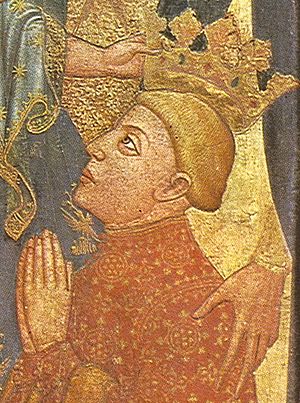Ferdinand I of Aragon facts for kids
Quick facts for kids Ferdinand I |
|
|---|---|

Ferdinand I being crowned by the infant Jesus in San Benito el Real Valladolid, by Juan Rodríguez de Toledo (c.1410–15)
|
|
| King of Aragon, Valencia, Majorca, Sicily, Sardinia and Corsica Count of Barcelona, Roussillon, and Cerdanya Duke of Athens and Neopatria |
|
| Reign | 3 September 1412 – 2 April 1416 |
| Coronation | January 1414 (Zaragoza) |
| Predecessor | Martin the Humane |
| Successor | Alfonso the Magnanimous |
| Born | 27 November 1380 Medina del Campo |
| Died | 2 April 1416 (aged 35) Igualada |
| Burial | Poblet Monastery |
| Consort | Eleanor of Alburquerque |
| Issue among others... |
Alfonso V, King of Aragon Maria, Queen of Castile John II, King of Aragon Henry, Duke of Villena Eleanor, Queen of Portugal Peter, Count of Alburquerque |
| House | Trastámara |
| Father | John I of Castile |
| Mother | Eleanor of Aragon |
| Religion | Roman Catholicism |
Ferdinand I (born November 27, 1380) was a powerful king who ruled several kingdoms. He was known as Ferdinand of Antequera and also the Just or the Honest. From 1412 to 1416, he was the King of Aragon, Valencia, Majorca, Sardinia, and Sicily. He was also a duke and a count of various lands. Before becoming king, he served as a regent (a temporary ruler) in Castile from 1406 to 1416. He died on April 2, 1416, in Igualada.
Ferdinand's Life Story
Ferdinand was born in Medina del Campo on November 27, 1380. He was the younger son of King John I of Castile and Eleanor of Aragon.
In 1403, Ferdinand started a new group of knights called the Order of the Jar.
A big moment in his life came in 1406. His older brother, King Henry III of Castile, passed away. Ferdinand was offered the crown of Castile, but he chose not to take it. Instead, he became a co-regent with Henry's widow, Catherine of Lancaster. This meant they ruled together while Ferdinand's nephew, John II of Castile, was still a child. Ferdinand was praised for how well he managed the country's affairs during this time.
Ferdinand also led a war against the Muslim Kingdom of Granada. In 1410, he successfully captured the town of Antequera. This victory earned him the nickname "Ferdinand of Antequera."
In 1412, a very important event happened. Ferdinand's uncle, King Martin I of Aragon, died without any children who could take over. This led to a big discussion about who should be the next king of Aragon. After much debate, Ferdinand was chosen to be the new King of Aragon in a decision known as the Compromise of Caspe. Another person, Count James II of Urgell, disagreed with this choice and started a rebellion. Ferdinand quickly put down the rebellion and ended the County of Urgell in 1413.
In 1416, Ferdinand created a special title called Prince of Girona. This title was meant for the person who would inherit the throne of the Crown of Aragon.
One of his most important achievements was helping to end the Western Schism. This was a time when the Roman Catholic Church was divided, with different people claiming to be the Pope. In 1416, Ferdinand agreed to remove one of these claimants, Antipope Benedict XIII. This action helped to bring the Church back together after nearly 40 years of division.
Ferdinand I was buried in the royal burial place at the Poblet Monastery. His son, Alfonso V of Aragon, ordered a beautiful tomb to be built for him in 1417. A famous Italian writer, Lorenzo Valla, even wrote an official book about Ferdinand's life.
Ferdinand's Family
In 1393, Ferdinand married Eleanor of Alburquerque (1374–1435). They had seven children:
- Alfonso V of Aragon (1396–1458), who became king of Aragon, Sicily, and Naples. He married Maria of Castile.
- Maria of Aragon (1403–1445), who became queen of Castile. She was the first wife of John II of Castile.
- John II of Aragon (1398–1479), who also became a king.
- Henry of Aragon (around 1400–1445), who was a duke and a count. He married Catherine of Castile.
- Eleanor of Aragon (1402–1445), who became queen of Portugal. She married Edward I of Portugal.
- Peter of Aragon (1406–1438), who was a count and a duke.
- Sancho of Aragon (around 1400–1416), who was a grand master of military orders.
What Was Ferdinand Like?
People described Ferdinand as being taller than average, thin, and having a reddish complexion with some freckles on his cheeks. He was known for being very patient. He would listen carefully to anyone who wanted to talk to him, even if their ideas were simple or not well-explained.
See also
 In Spanish: Fernando I de Aragón para niños
In Spanish: Fernando I de Aragón para niños
 | Misty Copeland |
 | Raven Wilkinson |
 | Debra Austin |
 | Aesha Ash |

